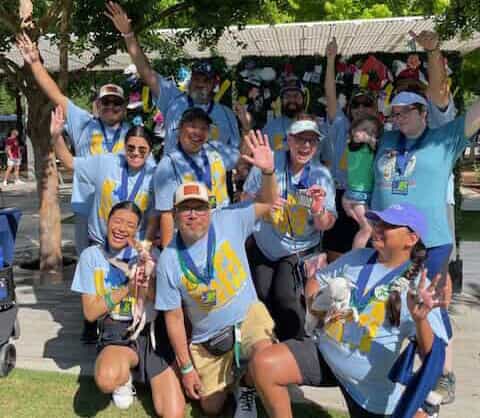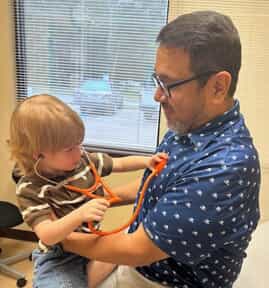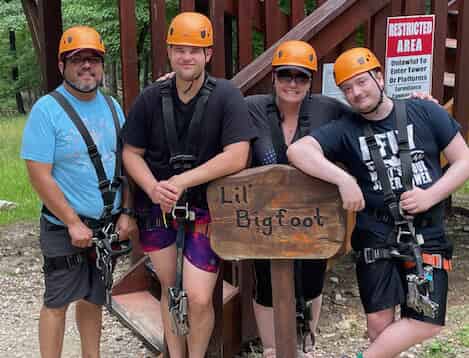- Date Published:
- Category: Patient Spotlights
His Family Saw Him Through A Failing Liver
As his health failed, he relied on his family 'at every step'
When his liver failed last year, 48-year-old Longview resident, Magdaleno “Junior” Jacquez III, turned to The Liver Institute for life-saving care.
“I’m no stranger to liver disease,” Junior says. “My mom and uncle both had liver issues, so it runs in the family, but I never expected mine to completely fail.”
In 2012, he was diagnosed with Type 2 diabetes and in 2016 non-alcoholic fatty liver disease (NAFLD). Two years later in 2018, Junior found out that his liver disease had progressed to a more severe form of fatty liver disease called nonalcoholic steatohepatitis (NASH).
For the next few years, Junior underwent annual testing to monitor his condition. In March 2023, his test results and blood work indicated that while his overall condition was stable, his liver wasn’t improving.

![]()
Symptoms start appearing
Shortly after his annual exams Junior began experiencing some mild abdominal discomfort that worsened as each week passed.
“I was feeling chronic, heavy bloating and had noticed changes in my bowel movements so I finally decided to go see a regular doctor since I couldn’t get in to see a gastroenterologist for several weeks,” he says. “The doctor didn’t have any answers so he suggested I go to the emergency room, which I did. They did blood work but didn’t see anything alarming and sent me home with extra strength diarrhea medicine.”
By July, both he and his wife, Robin, were concerned that something more serious might be going on, but never suspected it had anything to do with his liver. By sheer coincidence, Junior had his annual endoscope procedure scheduled for the next month. He was hopeful that the appointment would reveal some answers.
“By the time that appointment came around, I was so bloated I looked nine months pregnant,” he explains. “When I woke up from the endoscope procedure my wife was sitting next to my bed when the doctor came in and announced that he believes my liver is shutting down and I need to get on a transplant list.”
Junior and Robin were stunned. They couldn’t understand that in less than six months his liver had gone from functional to failing.
Needing a liver transplant
Junior and Robin learned that his bloating was ascites, a condition where fluid builds up in the abdomen, which is common in advanced stage liver diseases. The following day, Junior had a paracentesis, where 12 liters of fluid, weighing more than 20 pounds, were drained from his abdomen.
“I immediately felt better, but my family and I were in shock that my liver was shutting down,” he says. “I was referred to Dr. Parvez Mantry at The Liver Institute at Methodist Dallas Medical Center.”
“I was only home a few days after my first parenthesis and my heart began racing so badly I thought I was having a heart attack so we rushed to a local emergency room,” he remembers. “I ended up needing to stay for seven days while they tried to bring up my extremely low sodium numbers. We also learned my kidneys were beginning to struggle.”
According to Junior, Robin became a research hound overnight. She learned everything she could about diet and nutrition to help preserve what little liver function he had remaining. Yet even with his wife, oldest son Justin and family at his side helping him make the necessary changes, Junior’s health still deteriorated.
Getting evaluated for a liver transplant
Dr. Mantry confirmed what they feared most, he needed an immediate evaluation to get on the liver transplant list. Dr. Mantry explained that his MELD score of 17 likely meant a 1-3 year wait for a new liver.
“It was hard to hear, but we had been preparing for this as a family,” he says. “We made plans for the three-day evaluation process at Methodist Dallas Medical Center (MDMC), leaning on many extended family members to help coordinate.”
After returning home to Longview, Junior ended up in the hospital once again, but this time he requested to be transferred to Methodist Dallas like Dr. Mantry had advised.
Transplant ready
His frequent hospital stays indicated the rapid decline of his liver and kidneys. Within a few weeks, his MELD score jumped from 17 to 24.
By late October, Junior was feeling “barely alive and no longer bulletproof" while his family did everything they could to be ready for the news that he had been put on the waitlist.
A week later, news came that he had been listed for a liver transplant. “The entire family was thrilled, and we began making plans for when I got the call that a liver was available,” Junior says.
Nine days later, Junior learned he was the backup recipient for a liver. He was being prepped for the transplant when he found out that his sodium levels were too low to go through with the transplant.
“We were heartbroken,” he says. “But I had the best team of doctors and trusted their efforts.”
By now, Junior’s liver team had grown to include Dr. Alejandro Mejia and Dr. Vichin Puri, transplant surgeons as well as Dr. Amna Ilahe, transplant nephrologist, all on the medical staff at The Liver Institute at MDMC.
When Junior missed out on a second liver due to his deficient sodium levels, his team of specialists looked for new ways to get his health stable enough for transplant.


The right liver
His family rallied around him and his wife as the situation became more dire by the day. His team of doctors agreed he wasn’t leaving the hospital without a new liver and would perform the transplant with less-than-optimal numbers if the right liver became available.
“Just after midnight on November 16th, one of our favorite MDMC nurses came into my hospital room and gave us the miraculous news that a liver had become available and I was the primary,” Junior recalls. “Things happened quickly from there, but we knew surgery wasn’t scheduled until early evening. When they came to get me around 5am for surgery, we found out that another liver, a better matched liver, had just become available and we are doing the surgery now.”
Junior’s transplant surgery was a success, and he woke up feeling euphoric and healthier than he had in more than six months. After an allergic reaction to some of the medications used in surgery, Junior recovered on the dedicated transplant floor at MDMC.


Finally healthy again
Within a couple weeks, Junior’s health was thriving once again. He and his family had expected and prepared for the month-long hotel stay for follow-up care at MDMC, but Dr. Puri was so pleased with his recovery he released Junior to go home after just three weeks.
“What a blessing it was to be back home the day before my youngest son, Raymond, had his scheduled visit from the Navy for Christmas,” says Junior. “Through all of this, I really had to lean on my wife Robin, son Justin and my family and that was hard because I’ve long been the leader of our big family, but they took care of me so I could get back to taking care of them.”



